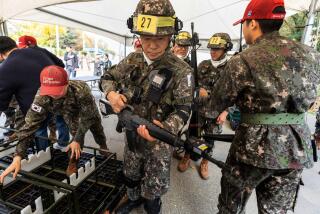For Once We’re Bargaining Away a Disadvantage
- Share via
Commentary on the recent breakthrough on nuclear-arms reductions confirms my earlier experiences in teaching nuclear-war strategy at the Army War College. On nuclear issues professional military officers are much more sane than either the protesters or the “experts.”
Whatever you do, when it comes to nuclear weapons, do not follow the biblical admonition to “let the little children lead you.” Several years ago anti-nuclear zealots demonstrated their concern by involving young children in the “Ban the Bomb” debate. One of their publicity ploys was to encourage the children to participate in nuclear “war games.” Inevitably the kiddies would end up nuking each other, then collapse in paroxysms of guilt and remorse over what they had done.
At the Army War College, on the other hand, in war games specifically designed to force the use of nuclear weapons, it was almost impossible to get senior military officers to breach the nuclear threshold. While moral considerations were not unimportant, the officers’ main objections were pragmatic. They could not see any military value in the use of nuclear arms.
And beware the “experts” as well. Like medieval scholastics, they created a closed fraternity with their esoteric equations, computer-driven models, arcane technical formulas and obscurantist jargon that for years overawed and dominated the strategic dialogue.
Lost in all this were common-sense fundamentals. Fifteen years ago the “experts” briefed the Army staff on the advantages of relying on nuclear weapons to defend Western Europe. For example, they said, U.S. tactical nuclear munitions were so small and so accurate that they could take out a Soviet artillery battery. That gave the United States an enormous advantage, for, lacking such technology, all that the Soviets could do was respond with their much larger and less accurate battlefield nuclear missiles.
“Let’s see if I’ve got this straight,” said then-Army Vice Chief of Staff Gen. Fred Weyant. “We take out a Soviet artillery battery. Then they take out our entire division artillery. And somehow that gives us an advantage. I’m afraid I can’t follow your logic.”
But such logic persisted. Almost 10 years later it resurfaced during discussion of the Carter doctrine for the Persian Gulf. President Carter had said that if the Soviets invaded Iran the United States would intervene with military force. According to the “experts,” we would fly a unit like the Army’s 82nd Airborne Division into a blocking position, and if the Soviet attack persisted we would use tactical nuclear weapons to halt their advance.
These experts failed to consider that by 1980 the Soviets had as many and perhaps more tactical and theater nuclear weapons than the Americans had. If we used nukes on them, they surely would respond in kind. Which, then, presented the more lucrative nuclear target--Soviet forces in mountain passes or U.S. lodgements on the Iranian coast? It was evident that the United States was far more vulnerable than the Soviets. This raised an obvious question that the “experts” had overlooked: Why advocate the use of a weapon system that puts you at an inherent disadvantage?
This was precisely the question that U.S.-Soviet nuclear parity posed to our North Atlantic Treaty Organization allies. But while the “experts” overlooked it through ignorance, NATO political leaders overlooked it by design. They did not ask the question because for social, political and economic reasons they could not stand the answer. With the nuclear deterrent to conventional attack checkmated by Soviet nuclear power, NATO would have to rely on its own conventional defenses. And conventional defenses were expensive in terms of both manpower and equipment.
Instead of facing the realities of the changed strategic equation, lip service continued to be paid to the fiction of NATO “first use” of nuclear weapons to contain a Soviet conventional attack. But with Soviet nuclear parity, “first use” no longer made military sense, since with its fixed defenses and its reliance on ports and airfields for reinforcement from abroad, NATO was more vulnerable to nuclear attack than were Warsaw Pact military formations.
But now, with the pending agreement on intermediate nuclear weapons, the key question--Why advocate the use of a weapon system that puts you at an inherent disadvantage?--has finally been addressed. While they still do not like the answer, NATO countries are stronger for finally facing reality. Military professionals could have told them that a decade and a half ago.
More to Read
Sign up for Essential California
The most important California stories and recommendations in your inbox every morning.
You may occasionally receive promotional content from the Los Angeles Times.













